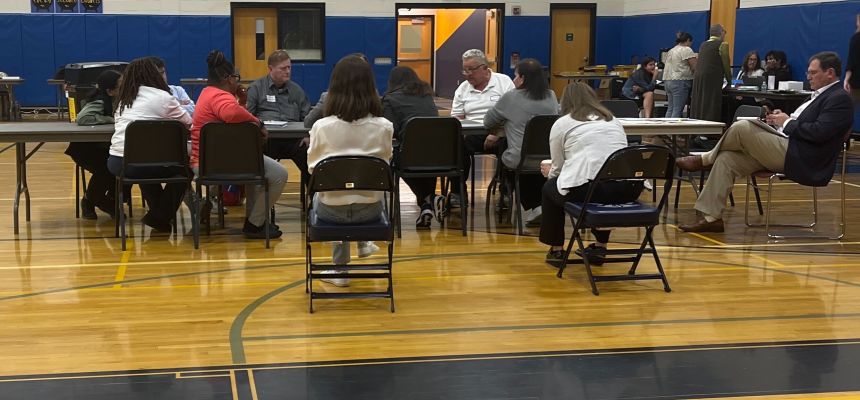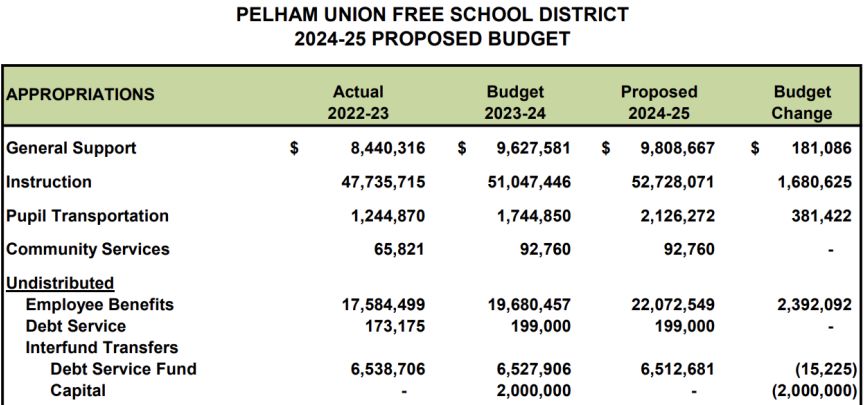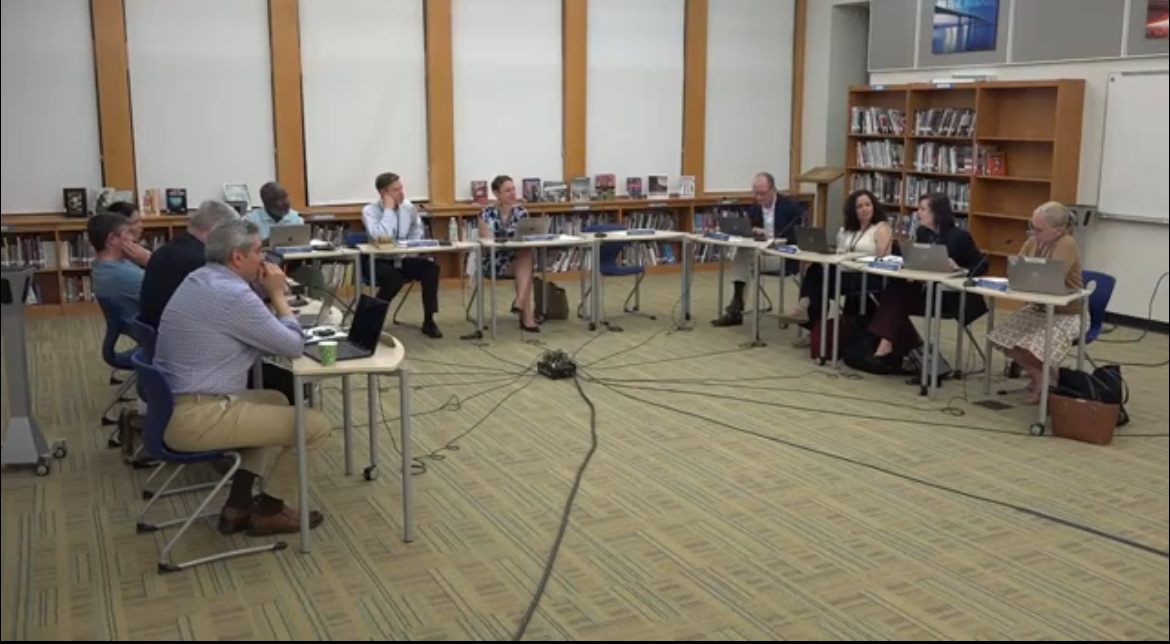The four candidates for two open seats on the Pelham Board of Education discussed diversity, equity and inclusion programs, the storm-water project proposed for Julianne’s Playground and upcoming fiscal challenges during a forum on Tuesday.
The forum, held in Alumni Hall at Pelham Memorial High School, was sponsored by the Council of PTAs and conducted with a moderator who asked questions submitted by the council and the public.
One-term incumbents Dr. Michael Owen-Michaane and Ian Rowe are on the ballot as are Kathryn Cohen and Darra Gordon. Owen-Michaane and Rowe are president and vice president of the school board, respectively.
The election will be held on May 21 in the Pelham Middle School gymnasium from 7 a.m. to 9 p.m. Residents will also be voting on a proposed $93.6 million budget for the year beginning July 1 and a proposition to allow the replacement of the synthetic turf at the Glover Athletic Complex stadium.
Diversity, Equity and Inclusion
The candidates commented on how diversity, equity and inclusion (DEI) fits into the current strategic plan and the ways in which they would incorporate it into the district’s efforts in the coming years.
“My work is DEI. I bring that into organizations consistently through my career,” said Gordon. “Regardless of the controversy of what it is, it should be in the fabric of everything that we do.” Gordon said DEI relies on an emphasis on accountability and community commitment.
Owen-Michaane said “diversity is increasing” in the make-up of Pelham’s population. “Inclusion and belonging is a core part of the mission of Pelham schools,” he said, and that it is a goal of his to avoid divisiveness and encourage inclusion within the community. “We implemented a new program, a school culture coach, charged with improving the culture and belonging at that school,” he said.
School culture coaches have been placed at each of the Pelham schools.
“When I think of DEI, I think of belonging,” said Cohen. She highlighted the importance of “fostering a sense of safety in all district buildings” through hiring teachers that students feel comfortable with and providing opportunities for students to learn about differences.
Rowe said he plans on maximizing the use of data collected by the district. “I’m a very big fan of a data dashboard, the ability for us as a board to see how our campus is doing,” said Rowe. He said he would use the data to detect if there are certain groups that are underperforming and figure out why. According to Rowe, the purpose of DEI is to ensure everyone’s kids are “performing at the highest level.” He also said it was important for there to be a public data dashboard for the community to see how schools are performing.
Proposed Julianne’s Playground Project
The Village of Pelham has sought to use Julianne’s Playground, which is owned by the school district, for underground reservoirs and pumps as part of a major upgrade of the sewers. Discussions between the school board and village have been going on since January, but the school district’s only offer of trading Julianne’s for land in Wolfs Lane Park was rejected by the village.
“All seven members of the board have an absolute commitment to resolving the flooding issue,” Rowe said. “”We are all victims of it.” Nonetheless, he said it would be “irresponsible” for the school board to “give the land away.” Rowe said he is in favor of a land swap to ensure there is property that the district can use to facilitate the health and wellness of Pelham students.
“The task for the board was to find a balance of being good stewards of the district’s property while trying to help Pelham’s stormwater issue,” said Owen-Michaane. “We have sort of reached an impasse” after the Village of Pelham rejected the land-swap proposal for the land along Wolfs Lane.
Cohen said the project was “a sticky situation to navigate.”
“The line gets blurred with what is a school district responsibility versus what is not, and I think if it touches the children who go to school that makes it a school district responsibility,” Cohen said. She said action should be taken to ensure Pelham families do not have to continue experiencing the trauma of loosing their possessions.
“We all need to come to the table in a collaborative way,” said Gordon. She highlighted the importance of safety while still looking out for best interests of district. She said we need to have a “collaborative and communicative conversation,” and it needs to be done fast.
Technology and Cell Phone Policy
Gordon said that ensuring technological literacy in the schools is the way to “harness innovation.” She said she believes educating young people on the threats of technology is critical in order to “teach them to be good citizens of the digital world.”
“What are the real problems we are trying to solve against” to ensure time and resources are not wasted on digital problems that are not really problems? Gordon said.
Owen-Michaane said one of the main challenges is that all the students have cell phones at the high school, “so the task from the board is how to balance the benefits with the potential downsides.” Owen-Michaane pointed to the U.S. general surgeon’s recommendation on limiting social media access for kids because of the negative impact it has on them. To acquire more information on the problem, he said, the district surveyed students, teachers and staff about cell phones. He said he plans to go through data and create a balanced approach to a new cell phone policy.
Rowe said he understands there are enormous opportunities through tech, but that “we as a board have to be cognizant of this kind of phenomena (social media addiction) happening in our schools.”
“Authentic learning to me is giving children the opportunity to learn hands-on, real-life experiences and how to apply that to their life outside of the classroom,” said Cohen. She said she prioritizes responsible technological use and that the district’s job is to “give students tools to let them manage it themselves with parents as partners on the issue.”
(Saying the dates are tentative, Superintendent Dr. Cheryl Champ told the May 8 board of education meeting that the goal is to have a discussion on the new policy during the June 5 board meeting with a vote by trustees on June 18. Indications are the new policy will be similar to the one in force in the middle school, where phones must be stored in students’ lockers during the school day.)
Fiscal Challenges
“Our budget is a reflection of our school board policies and goals,” said Cohen, who plans to maintain budget discipline and “ask the hard questions.” She said she would rely on data provided by district to understand what to prioritize while keeping a “trying-to-do more-with-less” mindset.
Owen-Michaane said “the challenge for the board of education is to sustain our programs into the future without breaking the tax cap.” He said reserve funds can be used to protect taxpayers from increases “when hard times come” and state aid would be used to cushion the effects of high prices.
As an incumbent, Rowe emphasized the importance of “continuity of leadership” due to the new five-year strategic plan being written. Rowe said the budget priorities are to “stay within the tax cap,” maintain responsible growth and reinforce the initiatives that are “allowing us to have an excellent school system.”
“Budgets are a plan in numbers” that define the goals for the year, said Gordon. She said she would maintain an “eye to the future” throughout the budget process so as to set up students in the district for success with a forward thinking, healthy and fully sustainable budget.
Inequity in Girls Sports
The candidates were asked how they would ensure female athletes have access to the same resources as male athletes after complaints in the past year over access to equipment and field time for girls teams.
“I’m committed in equity in sports,” said Cohen. “If people feel their girls are not getting equal access to things, then it is something we need to talk about.” Cohen said she would involve Athletic Director Joe Toombs in those conversations to find a solution.
Gordon said, “If there is a feeling of inequity, we want to dig deeper into that.” She said there would be a need to re-evaluate any opportunities the district could open up to young female athletes.
“For the board of education, our job is to make sure, as an oversight role, that all regulations are being followed, the relevant one being Title Nine,” said Owen-Michaane. He said when this conversation has come up in the past, he asked Superintendent Dr. Cheryl Champ and Toombs to review district policy to ensure equality across the athletics. “When we dug in to it and really reviewed, a lot of times there is so much complexity in terms of games and practices,” said Owen-Michaane. “Mr. Toombs really does his best to do things in an equitable way.”
Rowe agreed with Owen-Michaane, saying the challenge is “we have been in a reactive mode versus proactive,” which is why he said he stresses the use of a data dashboard to gather intelligence on the situation “before it is an issue.” Rowe said the role of the board should be to use data collected about practice times, field access and equipment to ensure equitable policies.
Correction: An earlier version of this story incorrectly stated who spoke about the dates for the school board’s upcoming meetings on the cell phone policy.
- The Pelham Examiner reports on education from Kindergarten musicals to board of ed meetings. Give now to support the nonprofit community newspaper that covers Pelham schools.









Kristen G Whalen • May 16, 2024 at 1:37 pm
I would like to know why we are prioritizing a new HS cell phone policy that is unprompted and unsupported by the community and HS students when the focus should be on completing our Strategic Plan.